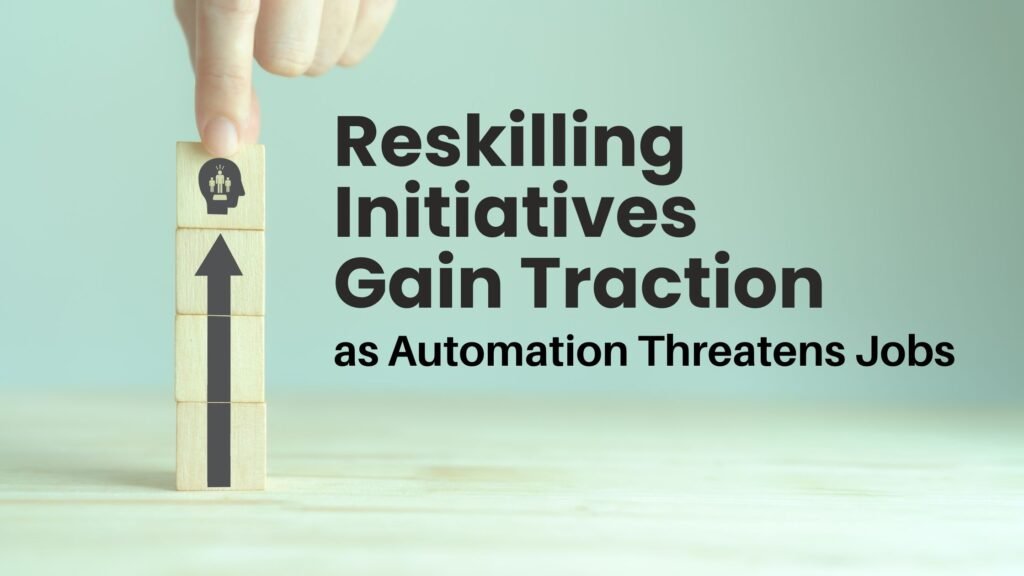Reskilling Initiatives are Gaining Steam as Automation Threats Jobs
Automation and AI are at the forefront and pose huge threats to industries and the global workforce. These technologies promise a boost in productivity, cost reductions, and catalytic innovation but pose a tough challenge to jobs. Millions of workers stand to lose their jobs as the machines take over repetitive and predictable tasks. Reskilling initiatives across the world are gaining momentum. Governments, corporations, and educational institutions are now taking more interest in developing the workforce to get ready for future jobs based on the rapid changes happening at work.
The Effect of Automation on Employment
Automation has been a part of the history of industrial development; however, the recent discoveries on AI, robotics, and machine learning have been shifting the dimension. A McKinsey report in 2017 indicated that about 800 million job displacements will be witnessed around the world by 2030. Routines, which involve repetition in work, are the most vulnerable jobs. Human labour is replaced by machines in manufacturing, transportation, logistics, and retail sectors.
For example, in manufacturing, robots now increasingly perform tasks previously done by humans: product assembly and packing, quality checks, and much more. A similar example can also be found on the retail and service sides, as kiosks and automated systems for customer service are changing jobs at cashiers and call center agents. AI also automatizes white-collar jobs. Even work in the area of data entry, bookkeeping, legal services, and medical, among other areas, is increasingly being automated by algorithms and software systems.
Contrary to the received wisdom, it is not just jobs that require low skills. Middle-skilled and even high-skilled jobs are at risk. AI’s capability to process and analyze large amounts of data will partially automate tasks in finance, health care, and legal fields. For example, AI machines can draft legal documents, analyze medical images, or give financial advice, which makes jobs at risk in sectors that have been considered most human-centric.
Reskilling: The New Hope in Dealing with Job Displacement
The situation of automation for the workforce has made this need to reskill and upskill acutely more pronounced in recent times. Reskilling means learning a new skill so that the worker can shift to a different type of job. Upskilling, on the other hand, refers to learning new competencies for a current job. Both are significant in supporting workers to adjust to the demands of the new job market.
Even while automation is sending jobs into a casualty column, it simultaneously opens up new ones. While automation can potentially eliminate as many as 75 million jobs, the World Economic Forum claims, in segments like technology, healthcare, or renewable energy, 133 million new roles could emerge. Different skill sets are being required for the new roles; therefore, reskilling is the way forward.
Government Strategies in Terms of Reskilling
All governments around the world have had to wake up to the reality of reskilling for the protection of their economy from mass unemployment and maintaining competitiveness among workforces. National reskilling programs are taking place in Singapore, Germany, and India.
1. Singapore: SkillsFuture Program
Singapore is one of the countries moving towards re-skilling its workforce. In 2015, the government created the program SkillsFuture, and through this initiative, it planned to motivate Singaporeans towards lifelong learning and skills development. The program offers citizens financial benefits to train in areas such as analytics for data, AI, cybersecurity, and advanced manufacturing. Preparing its workers with the needed skills in high-demand areas helps the country future-proof the workforce against automation.
2. Skills Re-skill in Germany
Germany is also one of the largest manufacturing countries. It has also taken up re-skilling heavily. The German government has developed a number of plans to re-skill workers in digitization and automation-affected industries. The Digital Pact for Germany focuses on improving digital skills of workers as well as reskilling in areas that include robotics, AI, and software development.
3. India, through the Skill India Initiative
India is one place of both opportunity and challenge as well because it has a humongous and relatively young workforce base. The Skill India initiative, launched in 2015, is aimed at enhancing the employability of the Indian workforce by giving training and skill development. The program re-skills the workers in technology-reliant sectors like the information technology and electronics sector as well as renewable energy sectors.
Corporate Reskilling Programs
Corporations are also reskilling their employees proactively. Corporates realize that automation is going to change the nature of work; hence, corporates like Amazon, IBM, and PwC are embarking on reskilling initiatives at a very ambitious scale in order to prepare employees for new technologies.
1. Upskilling 2025 Initiative by Amazon
Amazon, the one of the biggest employers in the U.S., had also committed a whopping $700 million for Upskilling 2025 – where it aims to retrain up to 100,000 of its staff by 2025 in areas of cloud computing, machine learning, and data science. What lies at the heart of this effort is to get them into more higher-paying, tech-focused roles either within the company or outside.
2. IBM’s SkillsBuild Platform
IBM is one company with a long history of technological innovation, and the company also demonstrated commitment to its reskilling initiative. With the SkillsBuild free online learning platform, it offers training in cybersecurity and data analysis as well as software development, ensuring workers acquire the skills required for workers to get into the digital economy, regardless of their existing skill.
3. PwC New World, New Skills
PwC, the world’s largest professional services firm, has recently announced its New World, New Skills initiative. This is aimed at skilling employees in ways that create sufficient ability to support clients in digital adaptation, a rapidly increasing business trend.
These are emerging skills for a future workforce:
As automation is continuously transforming the industrial world and making job security seem uncertain, there are emerging requirements for specific skills. Technology, creativity, and complex problem-solving tend to make workers less vulnerable to being displaced by automation. Following are some of the critical sectors in which reskilling efforts are concentrated:
- Data Science and AI: Given that increasing numbers of people rely on data to make decisions, there is an ever-accelerating demand for data analysis, machine learning, and AI skills.
- Cyber Security: More and more digitization in business activities requires sensitive data protection. Hence cyber security professionals play a very crucial role in the infrastructural armor.
- Software Development: Being an integral part of working of automation, software development professionals along with programmers will be in demands.
- Advanced Manufacturing: Automation is changing the face of the manufacturing world. The rise of robotics, 3D printing, and process automation leads to their increasing demand in the workplace.
- Green Energy: As renewable energy gains ground, more jobs are being created in the solar and wind industries, apart from other green technologies.
Obstacles to Reskilling Efforts
Although growing momentum is gaining for such workforce reskilling programs, many of these issues persist. One is about the fact that all workers should have the access to training. Because of financial and practical constraints, workers residing in low-income or rural areas are not likely to avail themselves of quality training courses. Moreover, getting workers motivated to get reskilled, especially in industries where automation has not hit them much, is also challenging.
Another problem is the cost to reskill. Most governments and companies today offer some form of financial help for training, but many workers will find it too expensive to do so. Also, workers are not likely to spend time and money reskilling if they have no idea what the payoff might be.
The Role of Lifelong Learning
Lifelong learning now becomes a concern of growing urgency in the face of ever-accelerating technological change. No longer can a worker expect one skillset to last the life of his or her working career. Instead, the worker must continue to acquire and refresh skills as their careers evolve in order to stay on top of their position in the labor market. Flexible and affordable, courses delivered through lifelong learning platforms, such as Coursera, edX, or Udacity, offer the space and opportunity for workers to go at their own pace.
Summing Up!
Reskilling is a much-required measure for preparing the workforce of the world to face the future of work. Collaboration at government, corporate, and educational levels is required to reskill people in new skills as millions of jobs are threatened to be displaced by this looming automation. Reskilling with lifelong learning helps them to make necessary adjustments in response to this ever-changing job market and spot opportunities created by technology. But the implementation of these kinds of projects will depend on how the access to the training problems is solved and the issues on funds.








Leave a Reply